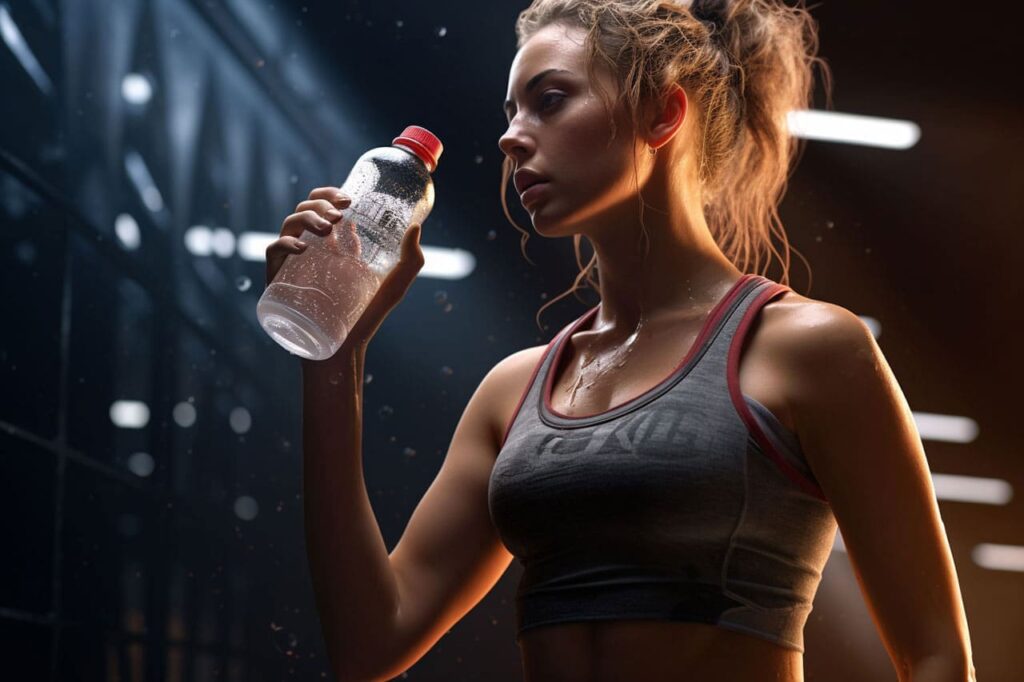As a fitness enthusiast, you know that hydration is essential for optimal performance. Drinking enough water and fluids is essential not only during workouts but also throughout the day to keep your body functioning correctly. In this article, we’ll discuss the role of hydration in fitness and give you tips for staying properly hydrated.
The Crucial Role of Hydration in Fitness
Proper hydration is a cornerstone of fitness, and its importance cannot be overstated. Engaging in physical activities triggers your body to produce sweat, which is an integral mechanism for cooling down the body. This, however, results in the loss of significant amounts of fluids, which if not replenished, can lead to dehydration.
Dehydration can prove detrimental to your performance during exercise, and beyond. It can result in muscle cramps, heat exhaustion, and a substantial decrease in your physical abilities, making workouts feel more challenging than they actually are. Furthermore, severe dehydration can also lead to more critical conditions like heat stroke, which can be life-threatening.
Adequate hydration plays a pivotal role in maintaining proper body temperature, ensuring the effective transportation of nutrients to cells, and facilitating the removal of metabolic waste from your body. These processes are essential for the optimal functioning of your body, especially during exercise when your body is under stress.
Overall, hydrating properly means safeguarding your body’s functionalities, ensuring your workouts are efficient, and protecting your health from the adverse effects of dehydration.
Determining Your Water Intake
The precise amount of water required can vary significantly from person to person, primarily depending on factors like weight, the intensity of physical activity, and the climate you live in. However, a general guideline suggests the consumption of at least eight 8-ounce glasses of water per day, often known as the “8×8 rule.”
If you’re engaged in exercise, it’s recommended to increase your water intake to compensate for the additional fluid loss through sweat. An additional 17-20 ounces of water should be consumed about 2-3 hours before initiating your workout.
Consider factors like your sweat rate, the duration of the exercise, and the environmental conditions when determining how much extra water you should drink. For prolonged exercises exceeding an hour, a drink containing electrolytes may also be necessary to replace the salts lost through sweat.
In warmer climates or during intense workouts where you might sweat more, increase your water intake further. Always listen to your body. Thirst is a late indicator of dehydration, so it’s essential to drink consistently throughout the day, even when you’re not feeling particularly thirsty.
Ultimately, maintaining hydration isn’t just about the quantity but also the consistency. Regular fluid intake should be practiced not just during and after workouts, but also as a part of your daily routine.
Tips for Staying Properly Hydrated
- Carry a water bottle with you throughout the day, so you always have water on hand.
- Drink water before, during, and after your workout.
- If you’re not a fan of plain water, try infusing it with fruits or vegetables to add flavor.
- Avoid sugary drinks like soda or sports drinks, which can actually dehydrate you.
- Eat foods with high water content, such as watermelon, cucumber, and celery.
- Pay attention to the color of your urine. If it’s dark yellow, you’re not drinking enough water.
- Set reminders on your phone to drink water throughout the day.
In Conclusion
Hydration, often overshadowed by diet and exercise, is a fundamental pillar of health and fitness. Its significance magnifies when it comes to optimizing fitness performance and overall well-being.
Ensuring that you’re adequately hydrated is not just about quenching your thirst but about maintaining the critical functions of your body. Hydration keeps your body temperature in check, enables efficient transportation of nutrients, aids in digestion, lubricates your joints, and expedites the removal of waste from the body. When you’re hydrated, you can perform better, recover faster, and enjoy your workouts more.
Paying attention to your hydration status during workouts is especially crucial. Physical activity leads to increased fluid loss through sweat, and replenishing these lost fluids is necessary to prevent dehydration and the subsequent decline in performance and potential health risks.
Following the guidelines and tips shared in this article will help you to maintain proper hydration. Aim for at least eight 8-ounce glasses of water a day, adjusting for your body weight, activity level, and climate. Remember to increase your intake before, during, and after workouts to compensate for the extra fluid loss.
While these are general guidelines, it’s important to listen to your body’s unique needs and adjust your hydration accordingly. Remember that hydration is a continuous process, not something to be considered only around your workout sessions. Make consistent water intake a part of your daily routine, and your body will thank you.
In conclusion, water is life, quite literally. It’s the cheapest and most accessible tool you can use to enhance your fitness performance, recovery, and overall health. So keep your water bottle close, and hydrate your way to improved fitness and wellbeing.
